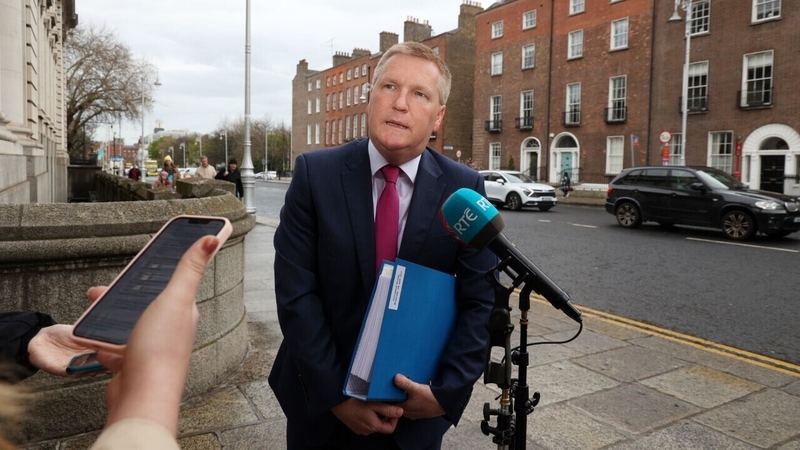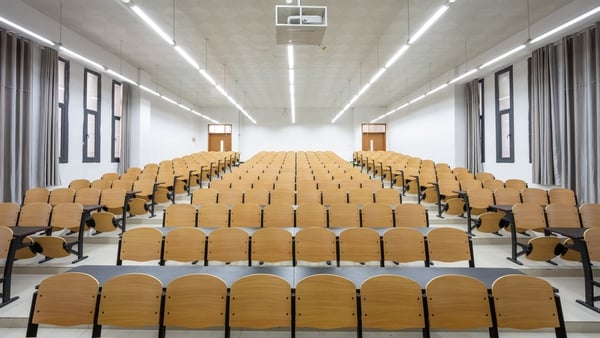Analysis: the Government's actions indicate they want to reduce inflation and they can do this by what they put in and leave out of Budget 2024
Two things have happened this month which suggest that the-powers-that-be are trying to reduce inflation. Firstly, the start of this month saw the VAT rate on hotels and restaurants increase up to 13.5% from 9%. Secondly, we have also seen another hike in ECB interest rates.
The reason for these changes is to reduce inflation by decreasing the amount of money circulating the economy. There is good reason to pursue this strategy if you consider that inflation left unchecked can continue to see prices climb and worsen the cost of living crisis.
We need your consent to load this rte-player contentWe use rte-player to manage extra content that can set cookies on your device and collect data about your activity. Please review their details and accept them to load the content.Manage Preferences
From RTÉ Radio 1's Morning Ireland, how should surplus money be spent in Budget 2024?
But these moves to reduce inflation may indicate that we could be heading for a tough upcoming budget. It should be noted that the Government are not desperately in need of money. They have quite a bit of money on handd in the national savings so they are not in major danger of running a deficit. However, their current actions seem to indicate that they want to reduce inflation and they can do this by reducing certain payments or increasing certain taxes in the budget.
There has been some discussion in the media which might suggest we could see a slightly conservative budget. Some are sceptical that Budget 2024 will do much to put money in the pockets of the people and former Minister for Finance Pascal Donohoe has mentioned that the Government need to be 'careful’ in the upcoming Budget.
We need your consent to load this rte-player contentWe use rte-player to manage extra content that can set cookies on your device and collect data about your activity. Please review their details and accept them to load the content.Manage Preferences
From RTÉ Radio 1's Today With Claire Byrne, attention on this year's budget is building so will we see cuts in taxes like USC?
More insight might be provided from measures taken in last year's budget. Then, we did see a €12 increase in the job seekers allowance and additional once-off payments for child benefit, fuel allowance, and people in receipt of disability allowance. Last year’s budget also saw some popular decisions regarding taxation as income tax rates didn’t increase, the standard rate income tax band was increased by €3,200, and there was a €75 increase to the Personal, Employee, and Earned Income Tax Credits.
Furthermore, there was also a €1,625 increase to the USC band raising it to €22,920 in an effort to ensure the salary of a full-time worker who was earning the minimum wage would stay outside the higher rates of USC. However, there was also a €7.50 per tonne increase to the carbon tax and the traditional yearly €0.50 increase to tobacco products. Additionally, last year’s budget saw the introduction of the Vacant Homes Tax, where owners of residential properties which are occupied for less than 30 days a year were charged three times the amount of the local property tax rate.
We need your consent to load this rte-player contentWe use rte-player to manage extra content that can set cookies on your device and collect data about your activity. Please review their details and accept them to load the content.Manage Preferences
From RTÉ Radio 1's News At One in Sep 2022, Minister for Housing Darragh O'Brien discusses the Vcant Homes Tax
A common theme which emerged from the previous budget which I think may manifest itself again this year is the clever decision making regarding tax collection. To give the Government their credit, they didn’t increase income taxes or cut social welfare payments. Instead they sought to collect their taxes from areas of society which may be perceived as already doing some kind of harm like carbon taxation, idle property and smoking. Not only does taxing these areas allow the Government to collect revenue for themselves, but the public sentiment towards taxing these things would be positive.
Economists refer to these taxes as Pigouvian taxes. Named after British economist, Arthur Cecil Pigou, a Pigouvian tax is one where the tax is placed on an activity which is deemed to generate negative consequences for the rest of society. In last year’s budget, one could argue that taxing carbon emissions was a good measure to help the environment, taxing vacant properties was a positive move to help the housing crisis and taxing tobacco products was a win for societal health. While people don’t generally welcome taxes, they may look more favourably upon taxes which are seen as serving some kind of greater societal good.
We need your consent to load this rte-player contentWe use rte-player to manage extra content that can set cookies on your device and collect data about your activity. Please review their details and accept them to load the content.Manage Preferences
From RTÉ Radio 1's Morning Ireland, interview with Minister for Finance Michael McGrath. 'We must weigh up pros and cons in relation to expenditure and cost of living'
So what are we likely to hear when Michael McGrath gets to his feet in the Dáil on October 10th to unveil his first budget? In keeping with what we've seen to date, my predictions for this year’s budget would be that we are likely to see increases in taxes to reduce inflation, but they are likely to be in areas which could be perceived as already having a negative impact on society. For example, this might include carbon tax, tobacco products, vacant property tax, and likely petrol and diesel prices.
Social payments are potentially less likely to be cut given the humanitarian purpose they serve. Reductions to social payment amid high inflation would also be seen as a brutal hit to people during a cost of living crisis and I’m not sure the Government would attempt it. However, with the need to reduce inflation being such a priority, we may see slight increases to general income taxes or the USC in an effort to curb consumption.
The views expressed here are those of the author and do not represent or reflect the views of RTÉ





